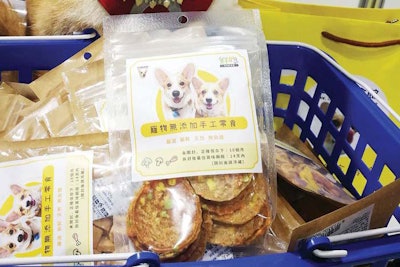
Taiwan has been highlighted as a top pet food market for U.S. exports and investments in a report published on Export.gov, the U.S. Department of Commerce International Trade Administration’s website, in late 2019. The report asserts that Taiwan’s societal shifts, in the form of rising incomes and Western influences, is changing the outlook on pets there, with industry experts noting rising purchases of commercial pet food in the state. Dogs are the preference in Taiwan, seen by many as a symbol of affluence.
Taiwan’s import dependence on pet food
Taiwan relies heavily on dog and cat food imports, which have been steadily rising as well. Pet food imports in 2018 totaled approximately US$180 million, up from US$78 million in 2009, compared to US$4.7 million in Taiwan pet food exports in 2018. The report estimates that total pet food sales in Taiwan equaled US$817 million in 2018, calculated by National Taiwan University through a market survey.
In terms of imports in 2018, five countries comprised 85% of the market share, according to the Export.gov report. Thailand held the largest market share (29.37%), followed by the U.S. (27.77%), France (11.97%), Canada (8.97%) and Australia (6.01%). The report contends that Thai brands are competitive due to their low cost, but mid- to premium-priced brands from the U.S. and Europe have seen growth in the past decade due to their perceived higher quality.
Exporters must focus on dry pet foods, aging pets
Mordor Intelligence shows similar analysis in its report, forecasting growth of 3.56% from 2019 to reach US$310 million in 2024. With 1.8 million dogs, Taiwan has seen increasing pet adoption rates, with 17.6% of dogs currently adopted. Sixty percent of that population is small breed, and 30% are senior dogs.
Partially, this shift is attributable to amendments to the Animal Protection Act 2018, which included articles for setting up animal shelters and improvements in pet food vending processes. The key takeaway is that the Taiwanese are quickly switching from feeding leftover scraps to feeding commercial dry food to their dogs, due to its convenience and ease of storage, with dry food comprising 80% of the market share.
Export.gov has further highlighted the need to focus on aging pets’ special diets as a premium brand category for consideration by exporters, since they currently occupy 25% of retail shelf space and e-commerce websites.
Crackdowns on pet food in Taiwan a positive signal for US exporters
With the ongoing African swine fever outbreak in China, increasing efforts by Taiwanese authorities to enforce laws related to pet food manufacturing, safety and quarantine have yielded results. In December 2019, amendments to the Statute for Prevention and Control of Infectious Diseases approved by the Taiwanese legislature sought to minimize the risk of animal disease entering the state through e-commerce platforms, including canned pet food.
Similarly, Taipei City Government identified 96 pet food products that failed to meet labeling information standards. The Taipei Department of Legal Affairs noted that the pet food companies were informed, and missing information was added to the pet food packages.
The increasing regulatory scrutiny of the Taiwanese pet food market will tighten competition and provide better longer-term prospects for U.S. pet food exporters to Taiwan, according to Export.gov.


















